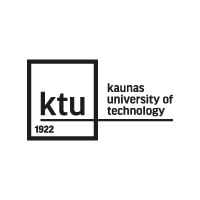Informatics Engineering
Position Details (PhD Program)
ThisInformatics Engineering programme at Kaunas University of Technologyis a joint doctoral studies with Vilnius Gediminas Technical University (coordinating institution: Kaunas University of Technology). This programme of doctoral studies aims to prepare future scientific leaders in the scientific field of Informatics Engineering.
PhD students of this Informatics Engineering programme at Kaunas University of Technology have a possibility to obtain a double degree programme with the University of Bologna, Italy. Informatics Engineering is a branch of computer science, focused on effective solution of practical computation and information processing problems with application of scientific knowledge.
Key facts
- Each doctoral student who aims to acquire doctoral degree has to complete doctoral studies (study workload is 30 credits), to conduct original scientific research in the scientific field of Informatics Engineering and to develop new scientific knowledge, to present his/her scientific research findings in national and international scientific conferences and scientific journals, to write and to orally defend his/her doctoral dissertation.
- The programme provides doctoral students with vast possibilities to complete at least one study module at the academic institution abroad, to participate in the PhD Summer / Winter Schools, and to actively take part in the most advanced scientific research at the state-of-the-art KTU Santaka Valley laboratories.
- The objective of the programme is to train world-class scientists of the Informatics Engineering field of science.
Right to doctoral studies acquired in cooperation with Vilnius Gediminas Technical University. Right to doctoral studies approved by the order No. V-1019 of the Minister of Education and Science of the Republic of Lithuania of 8 June 2011.
Courses include:
- Methods of Information Technologies;
- Large Scale Machine Learning Academic;
- Intelligent Business Process Modelling and Simulation;
- Artifical Intelligence in Information Systems;
- Cloud Computing Technologies;
- Conceptual Modelling and Knowledge Representation;
- Deep Learning Engineering;
- Hybrid Systems for Control and Optimisation;
- Information Security Technologies;
- Machine Learning and Neural Networks;
- Methods of Information Visualization;
- Methods of Multimedia Systems;
- Models of Information Requirements Specification;
- Process Modelling and Identification;
- Systems Analysis Technologies;



 Kaunas University of Technology
Kaunas University of Technology